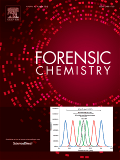
Forensic Chemistry
metrics 2024
Championing excellence in forensic science and practice.
Introduction
Forensic Chemistry is a premier journal published by Elsevier, specializing in the interdisciplinary field of forensic science, with a strong emphasis on analytical and materials chemistry, pathology, and law. Established in 2016 and converging to a significant publication trajectory through 2024, the journal has rapidly ascended to an impressive Q1 ranking across multiple categories, demonstrating its impact and commitment to advancing forensic analysis and methodologies. With an impact factor reflecting its relevance—especially notable with a 95th percentile rank in Social Sciences and Law—Forensic Chemistry serves as an essential resource for researchers, legal authorities, and academics seeking to explore the latest developments in forensic techniques and applications. Its rigorous peer-review process and high-quality publications ensure that it remains at the forefront of scientific inquiry in forensic practices. Access to the journal is available without an open access model, further emphasizing its commitment to curated, high-impact scholarship that contributes to both theoretical foundations and practical applications in the forensic field.
Metrics 2024
 0.99
0.99 2.60
2.60 2.60
2.60 27
27Metrics History
Rank 2024
Scopus
IF (Web Of Science)
JCI (Web Of Science)
Quartile History
Similar Journals
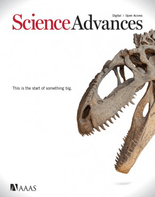
Science Advances
Your Gateway to Cutting-Edge ResearchScience Advances, published by the American Association for the Advancement of Science, is a leading open-access journal in the field of multidisciplinary sciences. Since its inception in 2015, it has rapidly gained prominence, achieving a remarkable Q1 ranking in both Medicine (miscellaneous) and Multidisciplinary categories, underlining its impact and relevance in contemporary research. With an impressive Scopus ranking of #7 out of 171 in the Multidisciplinary field, it proudly sits in the 96th percentile, showcasing its dedication to disseminating high-quality research across various scientific domains. This journal not only provides open access to innovative findings but also aims to foster collaboration and maintain a high standard of scholarly communication among researchers, professionals, and students globally. Stay updated with some of the most groundbreaking advancements and contribute to the collective pursuit of scientific knowledge through Science Advances.

Forensic Imaging
Enhancing forensic practices through impactful imaging methodologies.Forensic Imaging is a premier international journal dedicated to advancing the field of forensic science through the analysis and implementation of imaging techniques. Published by ELSEVIER, this open access journal provides a platform for researchers, professionals, and students to disseminate innovative studies that bridge the disciplines of Pathology, Forensic Medicine, and Radiology. Since its inception in 2020, it has gained recognition and holds a respectable Q3 ranking in its categories for both Pathology and Forensic Medicine and Radiology, Nuclear Medicine and Imaging, reflecting its commitment to high-quality, impactful research. The journal's practical focus on imaging methodologies offers valuable insights into forensic investigations and enhances professional practices, making it an essential read for those involved in forensic research and application. Available in both print and online formats, Forensic Imaging serves as a vital resource for fostering breakthroughs in the analysis of forensic evidence.
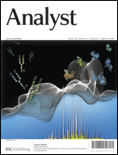
ANALYST
Illuminating Insights in Analytical and Environmental ChemistryANALYST, published by the Royal Society of Chemistry, stands as a prestigious journal in the fields of Analytical Chemistry, Biochemistry, Electrochemistry, Environmental Chemistry, and Spectroscopy. Esteemed for its rigorous peer-review process and influential contributions to the advancement of scientific knowledge, the journal has been a vital resource for researchers and professionals since its inception in 1876. With an impressive Scopus ranking that places it in the top quartile for several chemical disciplines, it specifically ranks #12 in Spectroscopy and #31 in Analytical Chemistry, reflecting its robustness and relevance in the analytical sciences. Though currently not an Open Access publication, ANALYST provides valuable insights and cutting-edge research that help drive innovation and discovery in various scientific realms. Researchers and students alike will benefit from its commitment to disseminating high-quality research that addresses contemporary challenges and promotes interdisciplinary collaboration.
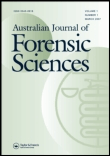
Australian Journal of Forensic Sciences
Connecting Researchers to the Heart of Forensic InnovationThe Australian Journal of Forensic Sciences, published by Taylor & Francis Ltd, stands as a pivotal resource in the field of forensic medicine and pathology. With an ISSN of 0045-0618 and an E-ISSN of 1834-562X, this esteemed journal has been at the forefront of forensic research since its inception in 1968. Currently classified in the Q2 category for the year 2023 within its domain, it ranks 92nd out of 208 journals, placing it within the 55th percentile in Scopus rankings. The journal's scope encompasses a diverse range of topics critical to the advancement of forensic sciences, making it an essential platform for researchers, professionals, and students seeking to stay abreast of the latest developments and methodologies in the field. Although not an open-access publication, the journal serves as a crucial conduit for disseminating high-quality research, contributing significantly to the ongoing evolution of forensic practice and knowledge.

Anil Aggrawals Internet Journal of Forensic Medicine and Toxicology
Innovative Research for a Dynamic Forensic CommunityAnil Aggrawals Internet Journal of Forensic Medicine and Toxicology, an esteemed publication in the field of forensic medicine and toxicology, is dedicated to disseminating innovative research and critical insights since 2000. Published by ANIL AGGRAWALS INTERNET JOURNAL FORENSIC MEDICINE & TOXICOLOGY, the journal caters to professionals, researchers, and students keen on advancing their understanding of forensic science, including its intersections with law and public health. Although it currently holds a Q4 quartile ranking in Law, Pathology and Forensic Medicine, and Toxicology, the journal provides a vital platform for underrepresented studies, encouraging a diverse range of scholarly contributions. With its open access model, the journal enhances visibility and accessibility, ensuring that valuable research can reach a wider audience. As the journal continues to evolve, it plays a crucial role in bridging theoretical knowledge and practical applications, thereby enriching the discourse within its fields of study and fostering inter-disciplinary collaborations.
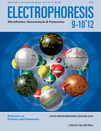
ELECTROPHORESIS
Exploring the Dynamics of ElectrophoresisELECTROPHORESIS, published by Wiley, stands as a premier journal dedicated to advancing the field of analytical chemistry, biochemistry, and clinical biochemistry. With an ISSN of 0173-0835 and an E-ISSN of 1522-2683, this journal has been a vital resource since its inception in 1980 and is poised to continue its journey through to 2024. Operating out of Germany, it holds a significant standing in the academic community, featuring in the Q2 category for Analytical Chemistry and in the Q3 tier for both Biochemistry and Clinical Biochemistry as of 2023. The journal ranks impressively within Scopus, occupying the 43rd position out of 156 in Analytical Chemistry and the 44th spot out of 117 in Clinical Biochemistry, ensuring its relevance and impact in these disciplines. Although it does not currently offer open access, ELECTROPHORESIS remains an essential publication for researchers, professionals, and students seeking cutting-edge insights and developments that influence the methodologies and technologies underpinning electrophoretic techniques.
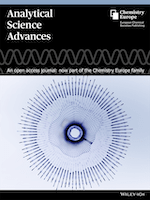
Analytical Science Advances
Leading the Charge in Analytical Method DevelopmentAnalytical Science Advances is a dynamic journal published by WILEY, dedicated to the ever-evolving field of analytical chemistry. With an ISSN of 2628-5452, this open-access platform aims to disseminate high-quality research and insightful reviews that push the boundaries of analytical methodologies and instrumentation. Since its inception in 2020, the journal has gained traction, securing a commendable Q2 ranking in 2023 within its category, highlighting its significance in the scientific community. Currently positioned at Rank #68 out of 156 in Scopus' analytical chemistry category, it boasts a 56th percentile ranking, reflecting its contributions to advancing analytical techniques. Researchers, professionals, and students will find this journal an invaluable resource for keeping abreast of the latest developments, emerging technologies, and innovative approaches in analytical science, ensuring the journal's relevancy and influence in shaping future discoveries.

Forensic Toxicology
Exploring the Intersection of Toxicology and Forensic MedicineForensic Toxicology is a premier journal published by Springer, renowned for delivering cutting-edge research in the realms of toxicology, biochemistry, and forensic medicine. With an ISSN of 1860-8965 and an E-ISSN of 1860-8973, this journal has established itself as a significant resource for professionals, researchers, and students engaged in the analysis of toxic substances within a forensic context. Its impressive impact factor and ranking reveal its influential presence in the field, particularly as it is categorized in Q1 for Pathology and Forensic Medicine and Q2 for Biochemistry (Medical) and Toxicology. Featured articles span a wide array of topics, facilitating interdisciplinary collaboration and advancing scientific knowledge. While currently not an open-access journal, it remains accessible through institutional subscriptions. With a convergence span from 2006 to 2024, Forensic Toxicology is committed to publishing high-quality research that enhances the understanding of toxicological phenomena and their implications in forensic investigations, reinforcing its role as an indispensable resource in the scientific community.

JOURNAL OF ANALYTICAL CHEMISTRY
Fostering Collaboration in Analytical DiscoveriesJOURNAL OF ANALYTICAL CHEMISTRY, published by PLEIADES PUBLISHING INC, stands as a pivotal resource in the field of analytical chemistry, offering an innovative platform for researchers, professionals, and students to advance their knowledge and contribute to the discourse within the discipline. With an ISSN of 1061-9348 and an E-ISSN of 1608-3199, this journal features a focused exploration of analytical methodologies, instrumentation developments, and applications across various domains, contributing to practical and theoretical advancements in the field. Currently ranked in the Q3 category in Analytical Chemistry with a Scopus rank of #111 out of 156, it provides critical insights and innovation strategies for professionals aiming to enhance their analytical capabilities. Access to the journal is through standard subscription models, and it covers an extensive range of topics pertinent to the discipline from 1996 to 2024. Engage with the JOURNAL OF ANALYTICAL CHEMISTRY to be part of a vibrant research community dedicated to push the boundaries of analytical practices.

INTERNATIONAL JOURNAL OF LEGAL MEDICINE
Elevating Standards in Legal Medicine ResearchINTERNATIONAL JOURNAL OF LEGAL MEDICINE, published by SPRINGER, stands at the forefront of research in the fields of legal medicine, pathology, and forensic science. With an ISSN of 0937-9827 and an E-ISSN of 1437-1596, this esteemed journal has successfully maintained its reputation as a leading publication since its inception in 1990, providing a platform for the dissemination of cutting-edge research and case studies. The journal is recognized as a Q1 category publication in the 2023 Pathology and Forensic Medicine quartiles, ranking #44 out of 208 in its category on Scopus, reflecting its significant contribution to the academic community—demonstrated by its impressive 79th percentile. While the journal operates under a traditional subscription model, it is committed to enhancing access to critical insights in legal medicine. The INTERNATIONAL JOURNAL OF LEGAL MEDICINE invites researchers, professionals, and students to explore its manuscripts that shed light on the intersection of law and medicine, thus pushing the boundaries of what is known in these vital fields.